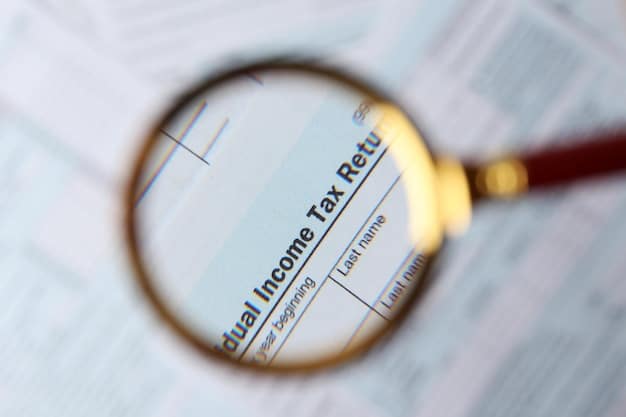Self-Employed? Maximize Your Savings with 2025’s Tax Deductions

Self-employed individuals in the U.S. can significantly lower their tax burden by taking advantage of often-overlooked tax deductions, including home office expenses, self-employment tax, health insurance premiums, retirement contributions, and business expenses, ultimately maximizing savings for the 2025 tax year.
Anúncios
Being self-employed comes with many perks, but navigating taxes can often feel like a turbulent journey, especially when trying to identify all the tax deductions you qualify for in 2025.
Unveiling Tax Deductions for the Self-Employed in 2025
For those who are self-employed, year-end taxes can often feel daunting. Knowing which tax deductions are available can save money and reduce stress. This guide helps self-employed individuals uncover many overlooked tax deductions for 2025, ensuring you retain more of your hard-earned income.
Navigating the self-employment landscape requires a strategic approach to tax planning. Take control of your finances and optimize your tax strategy with these deductions.
Home Office Deduction
One of the most common, yet sometimes overlooked, deductions is the home office deduction. If you use a portion of your home exclusively and regularly for business, you may be able to deduct expenses related to that space.
This includes:
- Mortgage interest or rent
- Utilities
- Insurance
- Depreciation (if you own your home)
The space needs to be exclusively used for business to qualify. Occasional personal use can disqualify the deduction. It’s wise to maintain accurate records, including photographs and floor plans, to support your claim.
In conclusion, understanding and claiming the home office deduction can provide significant tax relief for the self-employed by reducing taxable income and boosting overall savings.
Self-Employment Tax Deduction
Self-employment tax includes Social Security and Medicare taxes. As an employee, your employer pays half of these taxes. However, as a self-employed individual, you are responsible for paying the full amount.
The good news is that you can deduct one-half of your self-employment tax from your gross income. This is an above-the-line deduction, which means you can take it even if you don’t itemize deductions.
To calculate this deduction:
- Determine your total self-employment tax liability. This is the combined amount of Social Security and Medicare taxes you owe.
- Divide this amount by two.
- Deduct the result from your gross income.
This adjustment will reduce your overall tax burden. Always consult with a tax professional or use tax software to ensure accurate calculations. Remember taxes can be confusing, so seeking expert guidance ensures you avoid errors.
Ultimately, claiming the self-employment tax deduction offers significant financial relief by reducing overall tax liability, thus easing the burden of social security and medicare expenses.
Health Insurance Premiums
Paying for health insurance as a self-employed individual can be a significant expense. Fortunately, you can deduct the amount you paid in health insurance premiums for yourself, your spouse, and your dependents.
However, there are some qualifications:
- You cannot deduct premiums if you or your spouse were eligible to participate in an employer-sponsored health plan.
- The deduction cannot exceed your self-employment income.
The health insurance deduction encompasses medical, dental, and qualified long-term care insurance premiums. It also includes premiums paid on behalf of your children, even if they are over 26.
The deduction for health insurance premiums is an adjustment to income, meaning it reduces your adjusted gross income (AGI). This can lead to other tax benefits, as many deductions and credits are based on your AGI. Accurate record-keeping is essential to substantiate your health insurance payments.
In summary, deducting the health insurance premiums is crucial for self-employed individuals to help reduce taxes and provide financial relief.
Retirement Contributions: Securing Your Future
Saving for retirement is crucial, and the tax code provides several incentives for self-employed individuals to contribute to retirement plans.
Consider these plans:
- SEP IRA: Easy to set up and maintain, allowing contributions of up to 20% of your net self-employment income, capped at a specific amount annually.
- Solo 401(k): Can be either a traditional or Roth 401(k). As both the employee and employer, you can make contributions in both capacities.
- SIMPLE IRA: Easier to administer than a Solo 401(k), with contribution limits that allow for more flexibility.
Contributions to these plans are typically tax-deductible, lowering your taxable income and giving your retirement savings a boost. Evaluate the pros and cons of each plan to determine which one fits your needs and financial goals.
Contributing to a retirement plan not only secures your future but also offers substantial tax benefits in the present. Ensure you understand the contribution limits and deadlines for each plan to maximize your savings.
In conclusion, maximizing retirement contributions provides a solid financial future while simultaneously reducing current tax liabilities.
Deducting Business Expenses
As a self-employed individual, you incur various business expenses throughout the year. Many of these expenses are deductible, effectively reducing your taxable income.
Consider these common business expenses:
- Advertising and Marketing: Costs associated with promoting your business.
- Travel Expenses: Costs for business-related travel, including transportation, lodging, and meals (subject to limitations).
- Supplies and Materials: Expenses for items needed to run your business.
- Professional Fees: Payments for services like legal, accounting, or consulting.
Ensure expenses are both ordinary and necessary for your business to qualify for a deduction. For instance, advertising your business would be an ordinary expense, while traveling to a conference to improve job skills would be necessary expense. Detailed record-keeping is crucial to substantiate these deductions.
Keep receipts, invoices, and other documentation to support your claims. Track expenses using accounting software or spreadsheets to maintain accurate records. Consult tax guidance or professionals if there’s uncertainty.
Effectively deducting your business expenses can lead to significant savings on your tax bill, allowing you to reinvest those funds back into your business. Staying organized and informed is critical.
Education and Training Expenses
Investing in your professional development can also yield tax benefits. If you incur expenses for education or training that maintains or improves your skills in your current business (not to qualify you for a new business), they may be deductible. This includes courses, seminars, and professional development workshops. These expenses need to be directly related to your current profession.
These expenses may include:
- Tuition fees
- Books
- Supplies
- Transportation costs to and from educational venues
Keep detailed records of your expenses and ensure any educational activities directly relate to your self-employment work. This deduction can provide substantial relief while advancing your professional skills. It’s also a way to reinvest in oneself.
Staying informed about tax regulations ensures you capitalize on all available tax deductions, minimizing your tax liability and maximizing self-employment benefits.
In conclusion, education and career training tax deductions can provide additional savings by promoting financial stability and professional growth for self-employed professionals in the work field.
| Key Deduction | Brief Description |
|---|---|
| 🏠 Home Office | Deduct expenses for the portion of your home exclusively used for business. |
| ⚕️ Health Insurance | Deduct health insurance premiums paid for yourself, spouse, and dependents. |
| 💰 Retirement Contributions | Contribute to SEP IRA, Solo 401(k), or SIMPLE IRA to reduce taxable income. |
| 💼 Business Expenses | Deduct ordinary and necessary expenses like advertising, travel, and supplies. |
Frequently Asked Questions
▼
A home office expense includes mortgage interest or rent, utilities, insurance, and depreciation, provided the space is used exclusively and regularly for business activities.
▼
No, you cannot deduct health insurance premiums if you or your spouse were eligible to participate in an employer-sponsored health plan at any point during the year.
▼
You can deduct one-half of your self-employment tax from your gross income. This includes Social Security and Medicare taxes, effectively reducing your overall taxable income.
▼
Popular options include SEP IRAs, Solo 401(k)s, and SIMPLE IRAs. Each plan offers different contribution limits and administrative complexities to cater to your needs.
▼
You can deduct ordinary and necessary business expenses, such as advertising, travel, office supplies, and professional fees. Proper documentation and record keeping are key for all deductions.
Conclusion
By understanding and utilizing these often-overlooked tax deductions, self-employed individuals can significantly reduce their tax burden while securing their financial future. Ensuring compliance with regulations and consulting with tax experts is always advisable for personalized tax planning.







